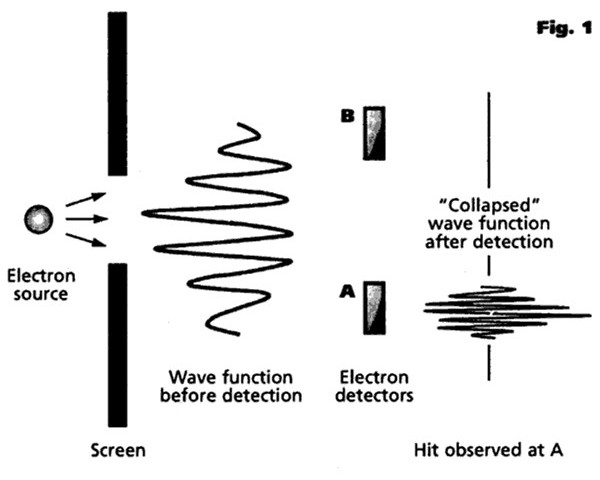
At the level of sub-atomics, where quantum effects can be predicted and observed, the customary distinctions between that which exists and that which might exist become blurred. Depending upon the desire of the observer and the methodology of observation, at the quantum level things can appear as either a particle or a wave, or both. For example, a single electron can manifest as either a particle or a wave, depending upon the nature of the experimental setup. Quantum mechanics includes the study of how information becomes matter, and vice-versa.
When material things manifest as waves, they carry information. This information can be used to predict outcomes, but not precisely; at the quantum level, outcomes can only be expressed as probabilities. In other words, a variety of probable outcomes can be predicted as to where a single electron will hit a target when emitted from an electron “gun.” These probabilities range from just above zero (non-zero) to much higher probabilities, but that is as certain as one may be. Quantum effects, therefore, generate probability waves which spread and form complex interference patterns until a specific outcome occurs, at which point the probability wave collapses.
Given that all things – including you, me and the family dog – are ultimately and entirely composed of quanta (at times “something” and at other times “nothing”) it is worth considering the degree to which intention alone contributes to the manifestation of what we call reality. Intention, in its purest form, is not material, and for all intents and purposes is just the establishment of probabilities of outcome, akin to the probability waves of quantum mechanics. Yet, intention is an ordinary, everyday human experience. Our intentions, purely mental and emotional and lacking all physical materiality, or “thingness” whatsoever, are powerful enough to transform the world, which we routinely do every day. When intention manifests as action, things change and suddenly, for example, dinner arrives on the table. With that outcome, the non-zero probability wave allowing that dinner might arrive on the ceiling instantly collapses.
Each of us constantly generates our own intention-based probability wave fields moment to moment, and they overlap and integrate with the fields created by multitudes of others; we are awash in an ocean of overlapping waves of intention. While one person’s intentions can transform a life or a home, or put dinner on the table, the collective effects of multiple probability waves of intention can move mountains. Gandhi knew this, as did Martin Luther King, and their positive intentions changed history. Negative intentions are no less powerful, thus Hitler and Pol Pot unleashed probability wave fields of terror, death and destruction. It is therefore, best to be mindful of our intentions.
Who’s to say that an electron has no desire or that an atom does not yearn to become a molecule? There are fields and forces in the universe about which we know nothing. Are we human beings simply highly-ordered persistent patterns, or is there more at play? It is not easy to understand the true nature of desire and intention, but quantum probability waves, the foundation of reality, may be composed of nothing less. Accordingly, intention is arguably the most powerful force in our lives, on this planet, and it seems, the entire universe.